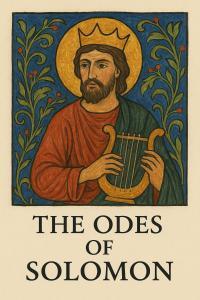
The Odes of Solomon is one of the earliest surviving collections of Christian poetry, consisting of forty-two short hymns that many scholars date to the late 1st or early 2nd century. Preserved mainly in Syriac manuscripts (with fragments in Greek and Coptic), the Odes provide a unique window into the spirituality of the earliest Christian communities. Their themes reflect baptismal practice, mystical union with God, and a strong emphasis on rebirth and renewal through the Spirit.
The voice of the Odes is deeply personal yet also liturgical. They are written as songs of joy, often in the first person, celebrating the experience of salvation and divine indwelling. The recurring image of “living water” connects them to both Jewish wisdom traditions and the Gospel of John, where water and Spirit are central metaphors for new life. Their language is filled with light, fragrance, music, and maternal imagery for God—expressions that set them apart from more formal theological writings of the same period.
Although the title attributes the work to Solomon, most scholars agree the hymns are pseudonymous. The attribution reflects a common practice in early Judaism and Christianity, linking new spiritual works to ancient figures of authority. The Odes likely originated in a Syrian or Antiochene context, where Jewish-Christian groups were developing their own forms of worship and theological reflection.
This public-domain edition presents J. Rendel Harris and Alphonse Mingana’s 1920 English translation, complete with introduction and notes. It was one of the first attempts to make the Odes widely available to an English-speaking audience, and despite its age, it remains a useful gateway for general readers. Later translations and studies have highlighted connections between the Odes and other early Christian texts such as the Gospel of John, the Didache, and the Shepherd of Hermas. Some scholars even regard the Odes as the earliest Christian hymnbook, predating many canonical writings.
For students of early Christianity, mysticism, or liturgy, The Odes of Solomon offer a rare and beautiful testimony to the devotional life of the earliest believers. They bridge the gap between Jewish psalmody and Christian hymnody, providing not only a theological vision but also a poetic one. Their language of intimacy with the divine has inspired both scholars and spiritual seekers, making the Odes a timeless resource for study and meditation.
Download the free PDF e-book here:

